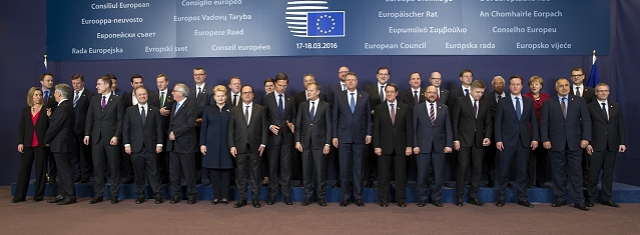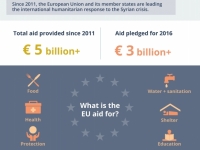Politics
Spain insists on the importance of defending the right to asylum
Brussels European Council

European leaders after de Council (Source: European Commission)
USPA NEWS -
The acting president of the Spanish Government, Mariano Rajoy, believes "important to defend the right to asylum" and that each application be treated individually. As explained at the end of the first session of the European Council in Brussels, Spain rejects the mass expulsions of refugees.
Regarding the immigration crisis, the EU has agreed in its conclusions support Greece and at the request of FRONTEX, Spain will send officials to the Hellenic country to help with the refugee crisis, since "we have very specialized in those subjects people," he said Rajoy. The acting president of the Spanish Government explained that the European Council has given "great importance" to readmission agreements because "they are essential for an orderly, sensible and reasonable immigration policy."
Regarding the agreement with Turkey, Rajoy believes that still "has not closed anything." However, he clarified that the position defended before European leaders is the one that was unanimously approved in the Spanish Parliament and demanded that "any decision taken is in accordance with international law." Otherwise, "it is clear that we can't support the conclusions," he said.
Rajoy stressed that "it is important to defend the right to asylum, which is not discharged in any way and no collective expulsions of people from the Greek islands to any other country." At this point, he considers "capital" that "all requests for asylum" is handled individually because "that's what has guarantees and that's what meets the international legality." Thus, he added, must "meet certain requirements, procedures" so that the final decision taken is "actionable."
As regards economic agreements, Mariano Rajoy said that "the most important thing ahead is to submit before April 30, Stability Plan for next year and the National Reform Plan." He also stressed that the economic policy of the EU hinges on three pillars: moving towards fiscal consolidation, continue reforms and maintain investment. With regard to this last point, the meeting discussed the Juncker Plan, which already has several positions projects "in brand in different countries of the Union." According to Rajoy, European leaders also talking about energy union and the single digital market, also agreed to "further progress in the economic and monetary union" issue that will be dedicated monographically the European Council in June.
Liability for this article lies with the author, who also holds the copyright. Editorial content from USPA may be quoted on other websites as long as the quote comprises no more than 5% of the entire text, is marked as such and the source is named (via hyperlink).






